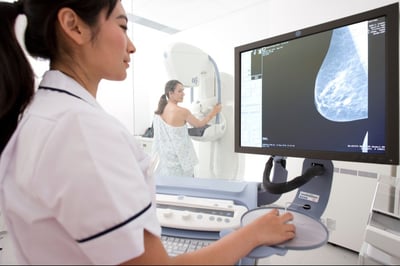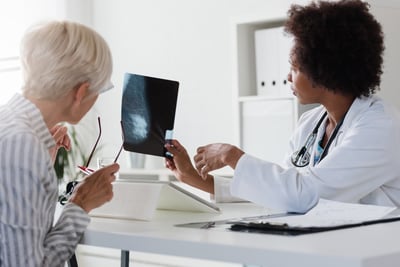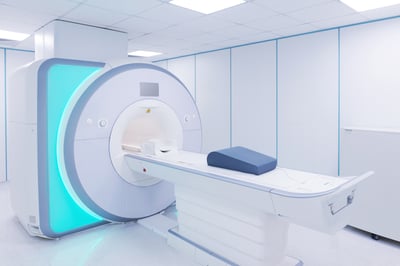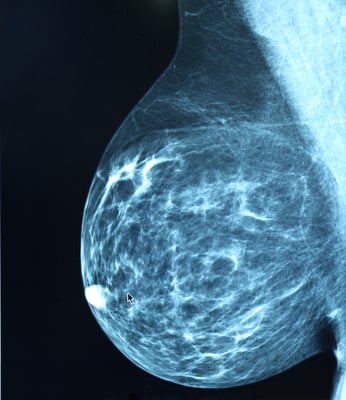FORCE's eXamining the Relevance of Articles for You (XRAY) program looks behind the headlines of cancer news to help you understand what the research means for you.
XRAY is a reliable source of hereditary cancer research-related news and information.
Learn more about the XRAY program
Keyword: mammogram
Article : Artificial intelligence (AI) may find breast cancer on mammograms sooner
Most relevant for: People interested in the use of artificial intelligence in medicine
Artificial intelligence (AI) tools may help doctors read mammograms. This assistance may lead to earlier diagnoses of breast cancer. (Posted 9/29/23)
Este artículo está disponible en español.
Read More
Relevance: Medium-High


Guideline : What is breast density and why does it matter?
Relevance: Medium-High


Most relevant for: People who have mammograms
New FDA guidelines for mammograms will go into effect by September 2024. Current FDA guidance requires hospitals and breast centers to give people information about their breast density with their mammogram results. By September 2024, mammogram providers will need to relay to patients who have dense breast that they should discuss the need for additional imaging. This article provides an overview of what breast density means and why it matters. (Posted 6/8/23)
Este artículo está disponible en español.
Read More
Relevance: Medium-High


Strength of Science: Medium-High


Study : Systemic racism may delay breast biopsy for Black and Asian people
Relevance: Medium-High


Strength of Science: Medium-High


Most relevant for: People who have had an abnormal mammogram
Black and Asian people are more likely to have to wait more than 90 days between an abnormal mammogram and a biopsy compared to white people. After accounting for other factors, the authors conclude that these disparities may be due to systemic racism. (Posted 3/8/23)
Este artículo está disponible en español.
Read More
Relevance: High


Research Timeline: Post Approval


Guideline : Expert guidelines on COVID-19 vaccines and timing of breast screening tests
Relevance: High


Research Timeline: Post Approval


Most relevant for: People considering screening mammography after getting a COVID-19 vaccine.
COVID-19 vaccines work by helping the immune system destroy the virus. Lymph nodes are an important part of the immune system. COVID-19 vaccines may cause temporary swelling in some lymph nodes, which may look suspicious on a mammogram. The Society for Breast Imaging and other professional organizations have released recommendations for the timing of mammograms after COVID-19 vaccines. (3/30/21)
Este artículo está disponible en español.
Read More
Relevance: Medium-High


Strength of Science: Medium-High


Research Timeline: Human Research


Study : Breastfeeding may lower risk of ovarian cancer in women with BRCA mutations
Relevance: Medium-High


Strength of Science: Medium-High


Research Timeline: Human Research


Most relevant for: Women considering breastfeeding who have inherited BRCA mutations.
Data from a large-scale study suggests that breastfeeding may protect against ovarian cancer in women with inherited mutations in BRCA1 or BRCA2. (1/28/21)
Este artículo está disponible en español.
Read More
Relevance: Medium-High


Strength of Science: Medium-High


Research Timeline: Human Research


Study : Research on the PARP inhibitor talazoparib (Talzenna) for early-stage breast cancer is promising
Relevance: Medium-High


Strength of Science: Medium-High


Research Timeline: Human Research


Most relevant for: People with early stage breast cancer who have an inherited BRCA mutation
The PARP inhibitor talazoparib (Talzenna) has been useful for treatment of advanced or metastatic breast cancer for patients with BRCA mutations. A preliminary study showed that the majority of patients who took talazoparib alone before surgery for early-stage breast cancer had effective treatment and manageable side effects. Expanded clinical trials are in progress to verify this result. (10/4/19)
Read More
Relevance: High


Strength of Science: Medium-High


Research Timeline: Post Approval


Study : MRI or mammograms for detecting breast cancer in families with unknown genetic mutations?
Relevance: High


Strength of Science: Medium-High


Research Timeline: Post Approval


Most relevant for: People with a personal or family history of cancer where no mutation has been found
MRI and mammograms are used together to detect breast cancer in high-risk women who test positive for a BRCA or other gene mutation that increases the risk for breast cancer. For women with a family history of breast cancer but no known genetic mutation, increased screening is recommended. But what method is best? A recent clinical trial in the Netherlands compared MRI and mammography for this population. (8/15/19)
Read More
Relevance: High


Strength of Science: Medium-High


Research Timeline: Post Approval


Study : Gaps in information about breast cancer risk and prevention impact African American women
Relevance: High


Strength of Science: Medium-High


Research Timeline: Post Approval


Most relevant for: African American women who are at high risk for breast cancer
A study showed that African American women with increased breast cancer risk experienced greater burdens in obtaining information at each step compared to white women. Racial differences in preventive choices correlated with differences in information and provider access. (3/14/19)
Read More
Relevance: High


Strength of Science: High


Research Timeline: Post Approval


Study : Disparities in research impact breast screening guidelines
Relevance: High


Strength of Science: High


Research Timeline: Post Approval


Most relevant for: Women at average risk for breast cancer
For women at average risk of breast cancer, the United States Preventive Services Task Force (USPSTF) currently recommends beginning annual breast cancer screening at age 50. However, because these guidelines are largely based on data from white women, they may not be sensitive to racial differences. A new study assesses the age distribution of breast cancer cases across race/ethnicity in the U.S. (6/21/18)
Read More
Relevance: High


Strength of Science: High


Research Timeline: Post Approval


Study : Should biannual MRIs replace annual mammograms in high-risk women?
Relevance: High


Strength of Science: High


Research Timeline: Post Approval


Most relevant for: Women at increased risk for breast cancer due to an inherited mutation
The risk of breast cancer is exceptionally high in women who have a personal or family history of breast cancer or who carry a mutation in BRCA or certain other genes. More frequent screening is one strategy for early detection of breast cancer for these women. Study results presented at the 2017 San Antonio Breast Cancer Symposium suggest that MRI screening every 6 months may be more effective than the currently recommended annual breast MRI and annual mammogram in detecting early stage breast cancers-which are more treatable-in high-risk women. (2/1/18)
Read More